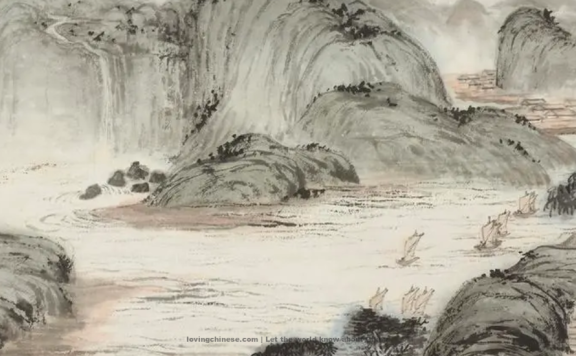-
Chao Buzhi: An Account of a Visit to North Mountain at Xin-cheng ~ 晁补之·《新城游北山记》 with English Translations
晁补之(1053年—1110年11月8日),字无咎,号归来子,济州钜野(今山东巨野)人,北宋时期著名文学家,“苏门四学士”(另有北宋诗人黄庭坚、秦观、张耒)之一。宋神宗熙宁年间,晁补之的父亲晁端友为新城县令,与时任杭州通判的苏轼时有诗歌唱和。晁补之随父同在新城,在苏轼门下亲闻教诲两年之久,《新城游北山记》就是这一期间写的。 Chao Buzhi (1053-1110 November 8), also known as Wujue and Guilaizi, was a famous literary figure from Juye, Jeju (now Juye, Shandong) during the Northern Song Dynasty. He was one of the "Four Scholars of the Su Clan" (along with poets Huang Tingjian, Qin Guan, and Zhang Lei). During the Xining reign of Emperor Shenzong of Song, Chao Buzhi's father, Chao Duanyou, served as the magistrate of Xincheng County and sang poetry with Su Shi, who was then the judge in Hangzhou. Chao Buzhi accompanied his father in the new city and personally learned about Su Shi's teachings for two years. "Journey to the North Mountain in the New City" was written during this period. The Journey to Beishan in Xincheng "is a travelogue of mountains and waters written by the Northern Song Dynasty writer Chao Buzhi. The article captures the words" deep "and" secluded "and uses a layered artistic approach to describe the sights and sounds of Beishan in Xincheng throughout the day and night. 晁补之·《新城游北山记》 去新城之北三十里,山渐深,草木泉石渐幽。初犹骑行石齿间。旁皆大松,曲者如盖,直者如幢,立者如人,卧者如虬。松下草间有泉,沮洳伏见,堕石井,锵然而鸣。松间藤数十尺,蜿蜒如大蚖。其上有鸟,黑如鸲鹆,赤冠长喙,俯而啄,磔然有声。 稍西,一峰高绝,有蹊介然,仅可步。系马石觜,相扶携而上,篁筱仰不见日,如四五里,乃闻鸡声。有僧布袍蹑履来迎,与之语,愕而顾,如麋鹿不可接。顶有屋数十间,曲折依崖壁为栏楯,如蜗鼠缭绕乃得出,门牖相值。既坐,山风飒然而至,堂殿铃铎皆鸣。二三子相顾而惊,不知身之在何境也。且暮,皆宿。 于时九月,天高露清,山空月明。仰视星斗,皆光大,如适在人上。窗间竹数十竿相磨戛,声切切不已。竹间梅棕,森然如鬼魅离立突鬓之状。二三子又相顾魄动而不得寐。迟明,皆去。 既还家数日,犹恍惚若有遇,因追忆之。后不复到,然往往想见其事也。 An Account of a Visit to North Mountain at Xin-cheng Chao Buzhi Thirty miles north of Xin-cheng, we went ever deeper into the mountains, where the plants, trees,…- 59
- 0
-
Chao Buzhi Poem: Water Dragon’s Chant – 晁补之《水龙吟》
水龙吟 晁补之 问春何苦匆匆,带风伴雨如驰骤。幽葩[1]细萼[2],小园低槛,壅培[3]未就。吹尽繁红,占春长久,不如垂柳。算春长不老,人愁春老,愁只是、人间有。春恨十常八九,忍轻辜、芳醪[4]经口。那知自是、桃花结子,不因春瘦。世上功名,老来风味,春归时候。最多情犹有,尊前青眼[5],相逢依旧。 注释:[1]葩:花。[2]萼:花外面的一轮叶状薄片,称萼片。[3]壅培:把土或肥料培在材料根部。[4]芳醪:美酒。[5]青眼:《世说新语》载,阮籍见凡俗之人以白眼相对,见嵇康携酒挟琴来,大悦,待之以青眼。后人以青眼表示尊喜,以白眼表示厌恶,也有以青眼指知心好友。司马光有诗:“呼儿取次具杯盘,青眼相逢喜无极。” Water Dragon's Chant Chao Buzhi Why should spring go so soon, indeed,With wind and rain like a galloping steed?The flowers sweet in garden smallAre not deep planted in the soil at all.Red blossoms will be blown down by the breeze;They cannot last longer than willow trees.Spring won't old grow.How can it bring woe?For weal and woeOnly in human world go.Nine out of ten people regret spring's fleet.Should we neglect a mouthful of wine sweet?The peach tree won't grow thin for springBut for the fruit which it will bring.Do not sigh for glory on the declineTill old are youOr till spring says adieu.Only a bosom friendBefore a cup of wineWill last to the end. Notes:The poet sighs for the departing spring and the weal and woe it brings.- 50
- 0
-
Chao Buzhi Poem: Song of Enchantment Written in Banishment – 晁补之《迷神引·贬玉溪对江山作》
The song is a poem written by Chao Tenzhi, a writer of the Song Dynasty.- 13
- 0
Checking in, please wait...
Click for today's check-in bonus!
You have earned {{mission.data.mission.credit}} points today
My Coupons
-
¥CouponsLimitation of use:Expired and UnavailableLimitation of use:
before
Limitation of use:Permanently validCoupon ID:×Available for the following products: Available for the following products categories: Unrestricted use:Available for all products and product types
No coupons available!
Unverify
Daily tasks completed

















